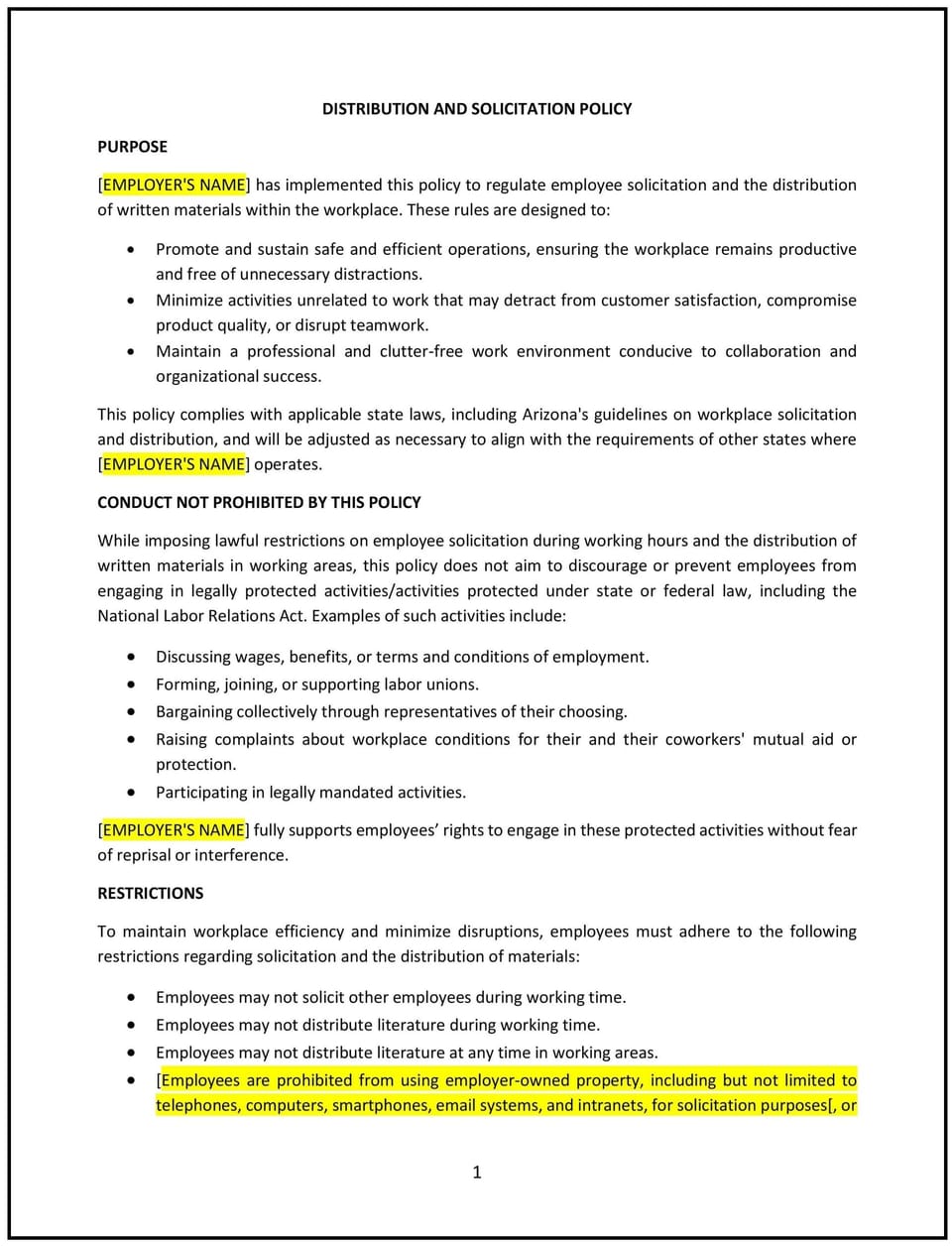Distribution and solicitation policy (Arizona): Free template

Distribution and solicitation policy (Arizona)
In Arizona, a distribution and solicitation policy provides businesses with guidelines for managing the distribution of materials and solicitation activities in the workplace. This policy helps maintain a professional environment, minimizes disruptions, and ensures compliance with state and federal labor laws, including the National Labor Relations Act (NLRA).
This policy outlines acceptable practices for distributing materials and engaging in solicitation, defines prohibited activities, and establishes procedures for handling violations. By implementing this policy, Arizona businesses can foster a focused and respectful workplace.
How to use this distribution and solicitation policy (Arizona)
- Define acceptable activities: Specify the types of distributions and solicitations permitted, such as approved charitable initiatives or company-sponsored events.
- Establish prohibited actions: Clearly outline what is not allowed, such as distributing non-work-related materials or soliciting during work hours.
- Designate permissible areas: Identify areas where solicitation or distribution may occur, such as break rooms, while prohibiting these activities in workspaces.
- Include procedures for approvals: Provide a process for employees to seek approval for distributing materials or soliciting support for causes.
- Enforce uniformly: Ensure consistent application of the policy to all employees to avoid perceptions of favoritism or discrimination.
Benefits of using a distribution and solicitation policy (Arizona)
This policy offers several advantages for Arizona businesses:
- Minimizes disruptions: Ensures workspaces remain productive by restricting non-work-related activities.
- Protects professionalism: Maintains a focused and respectful environment by regulating solicitation and distribution activities.
- Supports compliance: Aligns with Arizona labor laws and federal regulations, reducing the risk of legal disputes.
- Enhances consistency: Establishes clear rules, ensuring employees understand what is and isn’t allowed.
- Reduces conflicts: Provides a framework for addressing solicitation-related concerns or disputes effectively.
Tips for using a distribution and solicitation policy (Arizona)
- Address Arizona-specific considerations: Tailor the policy to reflect workplace norms in industries like retail, healthcare, or hospitality, where solicitation may arise frequently.
- Provide training: Educate employees and managers on the policy to ensure consistent understanding and application.
- Monitor compliance: Periodically review workplace activities to ensure adherence to the policy without infringing on employee rights.
- Include external parties: Extend the policy to vendors or visitors to ensure the workplace remains distraction-free.
- Review regularly: Update the policy to reflect changes in laws, workplace dynamics, or organizational needs.
Q: What types of solicitation are typically prohibited under this policy?
A: Prohibited activities may include selling products, promoting non-work-related causes, or distributing unauthorized materials during work hours or in workspaces.
Q: Are there exceptions for company-approved initiatives?
A: Yes, the policy can allow exceptions for company-sponsored activities, such as fundraising for charitable causes or internal events, with prior approval.
Q: How does this policy align with employee rights under the NLRA?
A: The policy respects employees’ rights to engage in protected activities, such as union organizing, while supporting compliance with Arizona labor laws.
Q: Can external vendors distribute materials in the workplace?
A: No, the policy typically prohibits external vendors or visitors from distributing materials or soliciting employees unless explicitly authorized by management.
Q: What steps should businesses take to enforce this policy?
A: Businesses should communicate the policy clearly, monitor workplace activities, and address violations promptly and consistently to ensure adherence.
This article contains general legal information and does not contain legal advice. Cobrief is not a law firm or a substitute for an attorney or law firm. The law is complex and changes often. For legal advice, please ask a lawyer.


